The Deepest Break
Victims of intimate-partner violence may suffer brain injuries. Sophia Sobota thinks they deserve to know.
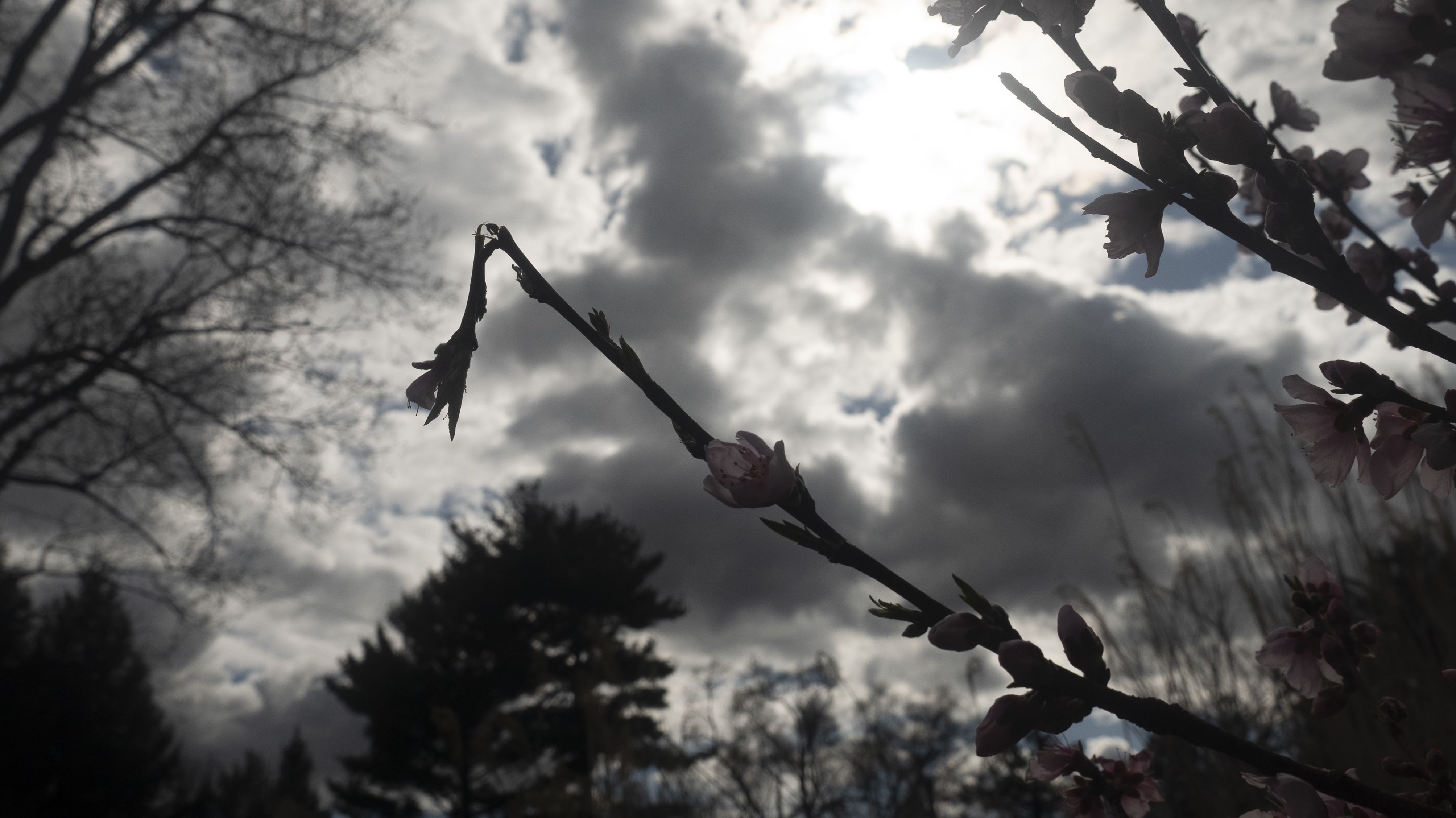
Intimate-partner violence, and the results from this behavior, are a global epidemic. That's one of many things Sophia Sobota has learned in her few short years working on this issue, beginning as a sophomore at Denison University.
In the following podcast, Sobota talks to Dr. Eve Valera, associate professor at Harvard Medical School and research scientist at Massachusetts General Hospital, who has set the pace in the emerging field of brain injury resulting from intimate-partner violence.
Sobota's story won the Denison Journalism program's annual Buzzy award, as part of its spring Podcast-a-thon. Dr. Heather Rhodes, Neuroscience Department Chair, was her supervising professor. The Podcast-a-thon is sponsored by a major grant from the Mellon Foundation which encourages the use of storytelling to convey academic subjects to a broader audience.
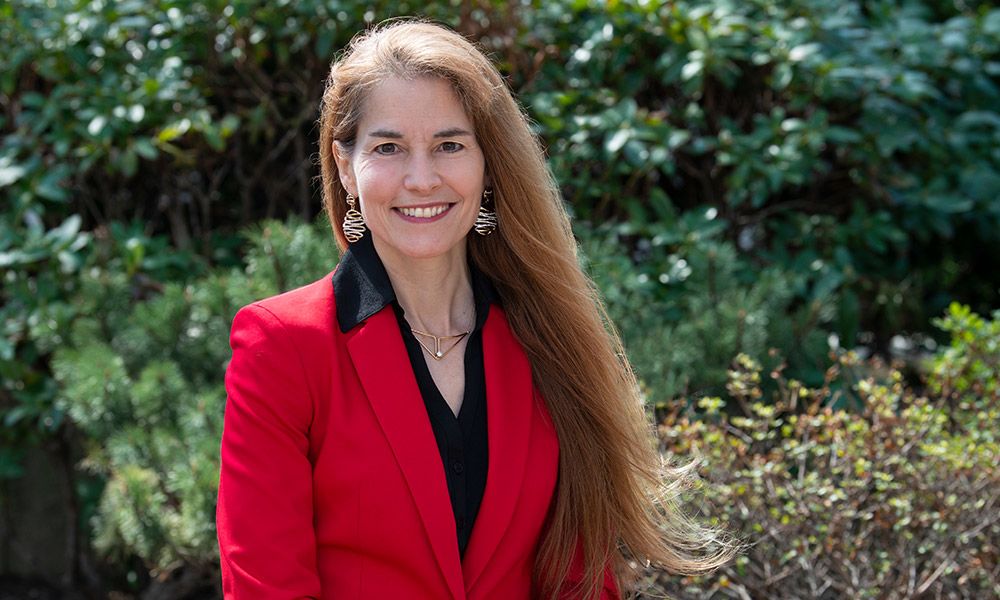
"Public awareness is critical to implement change," says Dr. Eve Valera, shown above. Photo from The Valera Lab website.
"Public awareness is critical to implement change," says Dr. Eve Valera, shown above. Photo from The Valera Lab website.
5 Questions with Sophia Sobota
Since her sophomore year, Sophia Sobota has been seeking out opportunities to work in a field for which she has great passion — the study of brain injuries resulting from intimate-partner violence. When the opportunity came to make a podcast about it, she was first wary of what was being asked, and then became excited by this new opportunity.
Following are five questions with the Denison University senior who has already accomplished important things, and has many more goals ahead of her.
[Note: This interview was edited for conciseness and clarity.]
TRP: How did you get involved in the subject of intimate-partner violence brain injuries?
SS: Two summers ago, my sophomore year summer, I reached out to The Cridge Centre for the Family in Victoria, British Columbia. I wanted to get involved in this topic and was trying to figure out what the best route was. I did some research on their website, and they were just beginning to develop their intimate-partner violence brain injury program. And they wanted to get their program up and running there. I was hired as a training developer. I was doing a lot of research, working by myself, and was given the creative freedom to do so.
TRP: How did you get connected with the Ohio Domestic Violence Network?
SS: As I was independently researching at The Cridge, I ran across a lot of the Ohio Domestic Violence Network’s publishings, and their website, and all of the work they're doing. Originally, I thought my computer must be programmed because I live in Columbus, and maybe it was technology picking up Ohio sources. But I soon learned that the Ohio Domestic Violence Network is leading these efforts for brain injury resulting from violence for not only the State of Ohio, but also nationally, and they're having international conversations as well. So, I reached out to them, and shared what I did at The Cridge, and my goals for the next summer and how I wanted to start to work with them. I explained that I felt so grateful for the opportunity to live in Columbus and be at Denison. They hired me as an undergraduate research assistant. ODVN has a partnership with The Ohio State University College of Public Health to do their research. I quickly got onto a project with Dr. Julianna Nemeth, Assistant Professor within the College of Public Health. I started doing some data analysis with her. She was looking at federally qualified health centers’ understanding of brain injury when providing care to domestic violence survivors. Then, we had the opportunity to start writing a chapter on traumatic brain injury/hypoxic-anoxic injury resulting from violence that is going to be published in the book Intimate Partner Violence: A Health-Based Perspective. I spent most of my summer co-authoring that chapter with Dr. Nemeth, Rachel Ramirez, and another doctor who contributed his clinical perspective. And so that was just a wonderful opportunity. The book was just sent to Oxford University Press for the final editing and publishing stages.
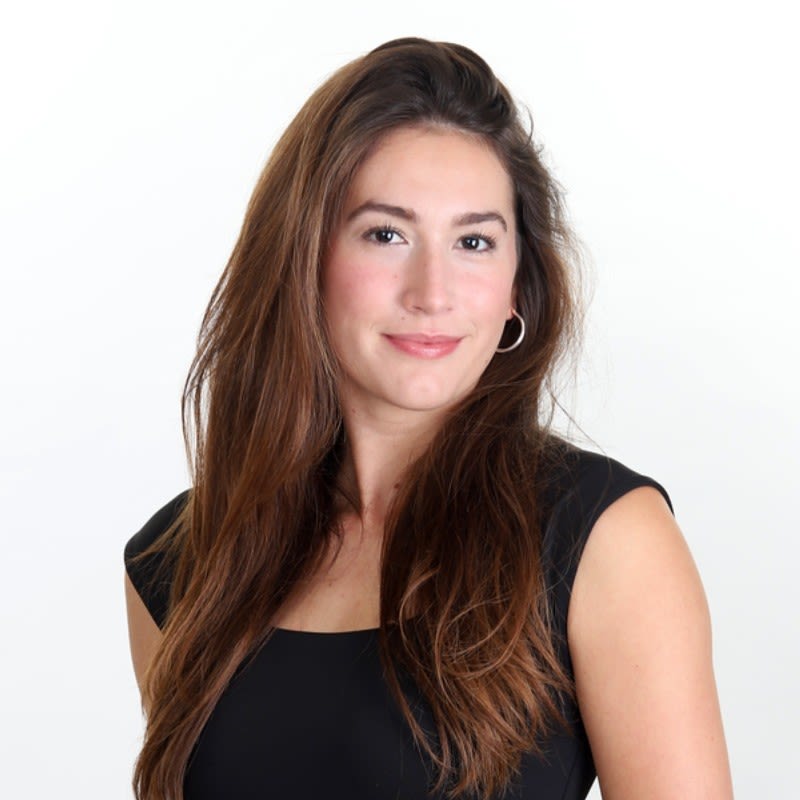
"I think we understand that violence is a problem in our communities," says Sophia Sobota. She is a senior at Denison University. Photo by Angie Bammer Holmes.
"I think we understand that violence is a problem in our communities," says Sophia Sobota. She is a senior at Denison University. Photo by Angie Bammer Holmes.
There are people in our communities–they are our friends and individuals we encounter in everyday life–and they may be suffering from this. I wanted to make the issue known, as difficult as it is.
-Sophia Sobota
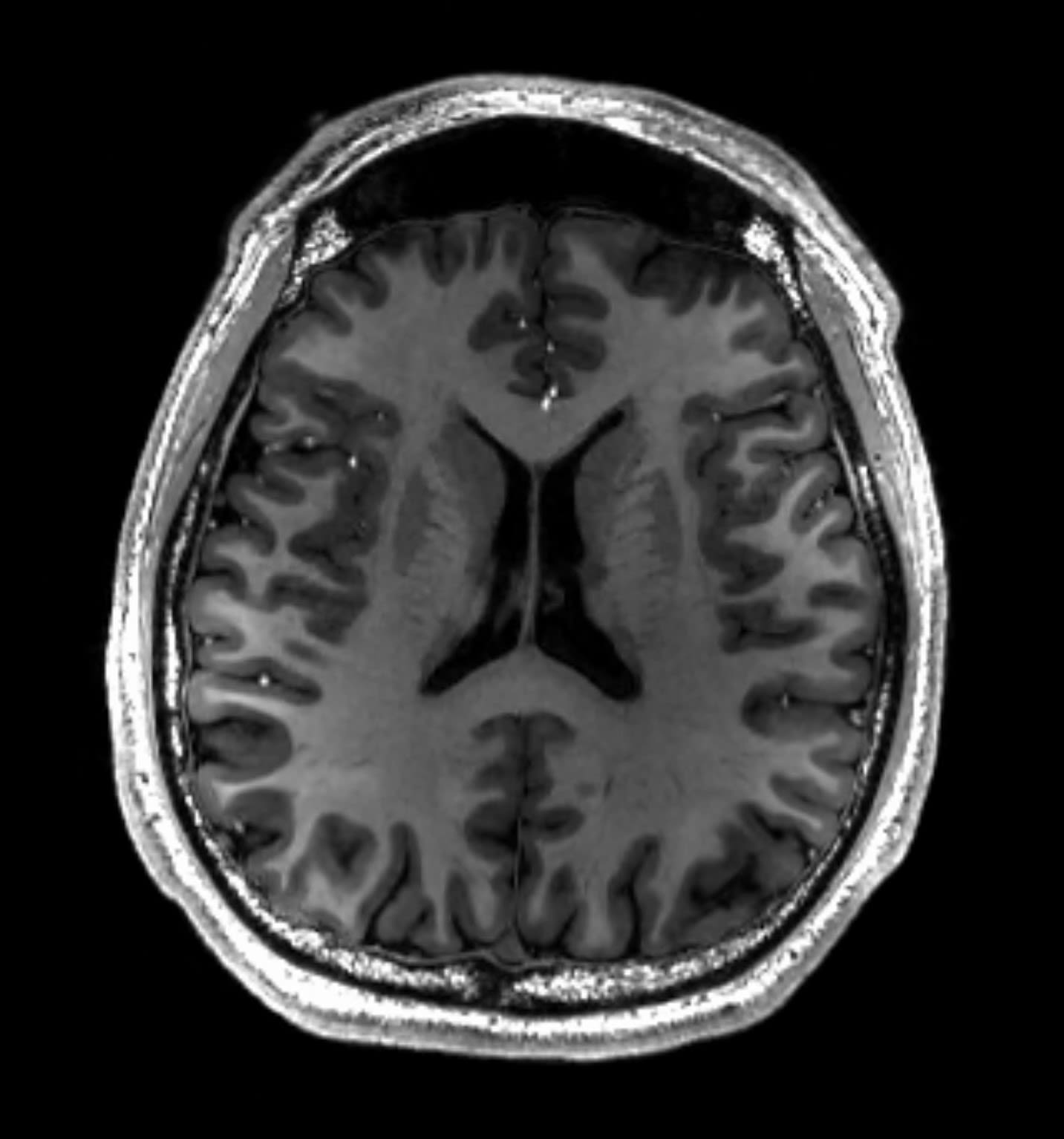
TRP: Research is traditionally done in a written study or report. How did you happen upon the idea of creating a podcast?
SS: For my Neuroscience Capstone Seminar, Dr. Heather Rhodes presented this project to us, and at first, I was a little, what's the word? Hesitant? I had just never done something like that before. Then I was excited, but also wondering how it would all come together. The whole idea behind her course really is this idea of scientific communication and scientific literacy, focusing on how we, as scientists, and now neuroscience experts in the field, communicate science in a way people are going to understand. I really thought that this was a great idea. I knew right away that I wanted to do something meaningful within this field of brain injury resulting from violence, and I knew that I would have the connections to someone who is a foundational leader in the field. So that made me really excited. I also saw the opportunity to get the message to the Denison community, which is something I've really wanted to do the past four years here.
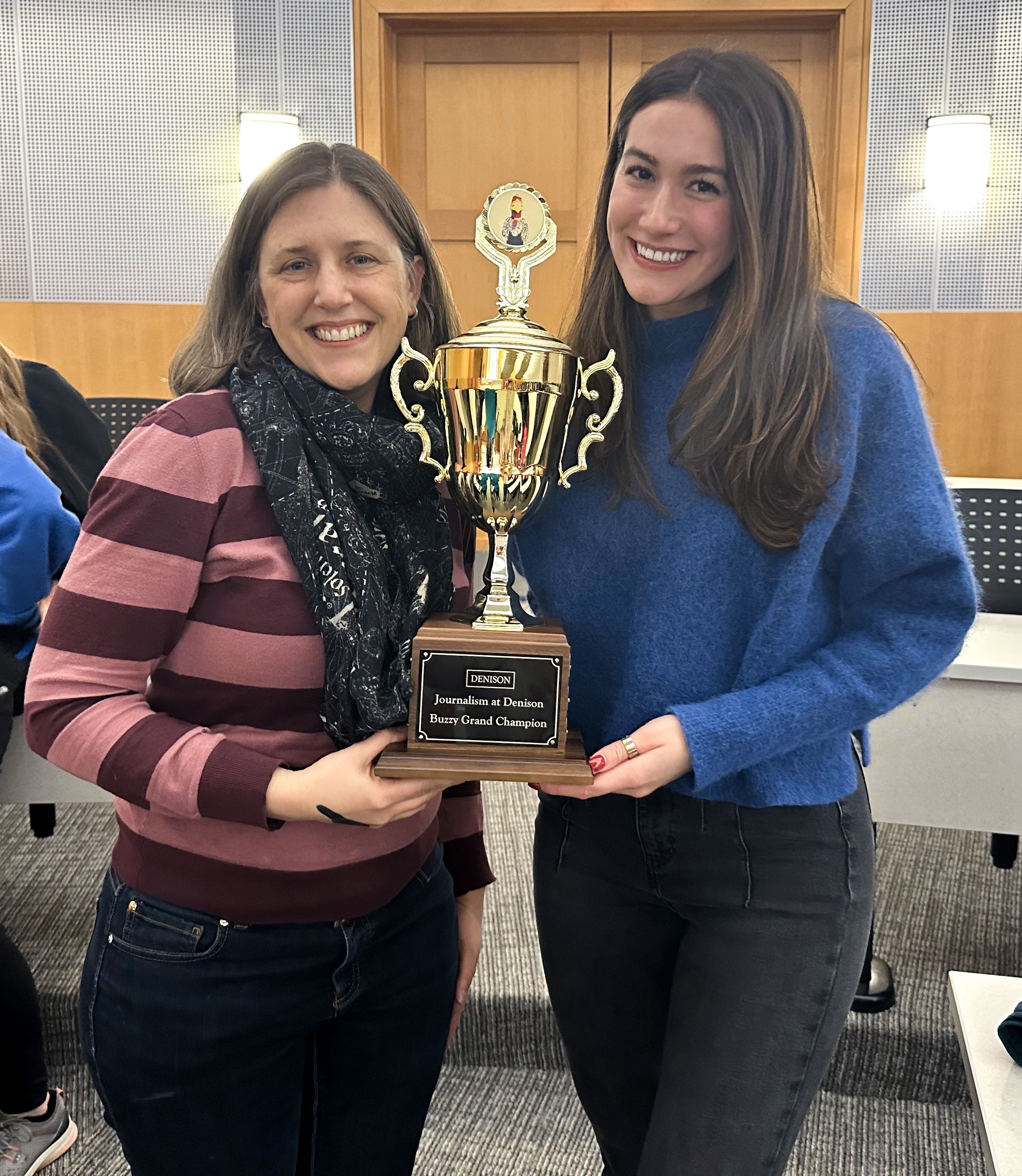
Dr. Heather Rhodes, left, assigned and supervised Sophia Sobota's podcast. They hold the Buzzy award on the night the story won. Photo by Stephen Young.
Dr. Heather Rhodes, left, assigned and supervised Sophia Sobota's podcast. They hold the Buzzy award on the night the story won. Photo by Stephen Young.
I think we understand that violence is a problem in our communities. We recognize interpersonal violence and power-based violence against not only women, but the transgender community, the LGBTQIA+ community, and minority groups. We know the violence is happening. But the connection to brain injury needs to be made, it needs to be one in the same. When we think about violence, we know that the primary targets for violence, specifically physical abuse, are the head, neck, and face. And we need to make the connection that brain injury is a real prevalent possibility. And it is a reality. And there are people in our communities– they are our friends and individuals we encounter in everyday life–and they may be suffering from this. I wanted to make the issue known, as difficult as it is.
TRP: Is there anything you discovered by working with audio and storytelling that you might not have if you worked in traditional research methods only.
SS: It really was about trusting the process. We were assigned to have an hour interview. It really was learning how to pick out what is the most important part, what are the most important pieces of this interview, what's going to capture the reality of this issue and how people need to understand it, right? It needs to not only be logical and include all of the important pieces, but it has to have a natural flow. Also, I was so grateful to work with Claire Roth, of the Ohio Newsroom. [Editor's note: Students who participated in the Podcast-a-thon were able to meet with professional audio producers.] She really opened my eyes to this side of journalism and podcast making, because she took a transcript and really saw a story, which was just so cool to see. And, when we were collaborating, and going back and forth, I got really excited about it. I was ready to go and make it great.
TRP: You are graduating in May. What’s next for you?
SS: Dr. Eve Valera asked me if I could do a podcast with a brain injury survivor. I plan to do that after graduation, work with her and figure out how to conduct the interview and produce another podcast. To my knowledge, there aren't any podcasts that exist yet with specifically intimate-partner violence brain injury survivors, besides the NPR podcasts that Dr. Valera did. I think that would be another great perspective for people to learn from, to listen to a survivor and their daily life. I plan to continue doing my research at OSU. I plan to study for my LSAT and will attend law school in 2025. I see the need for a lawyer who is informed by this neuroscience perspective; I really see the need to bring the medical and legal systems together. Eventually, I want to work in public policy, because I see the need to write legislation recognizing brain injury and the life-long challenges that come with it.
